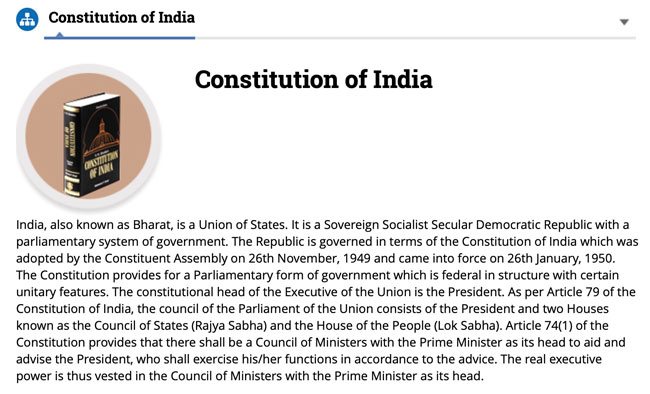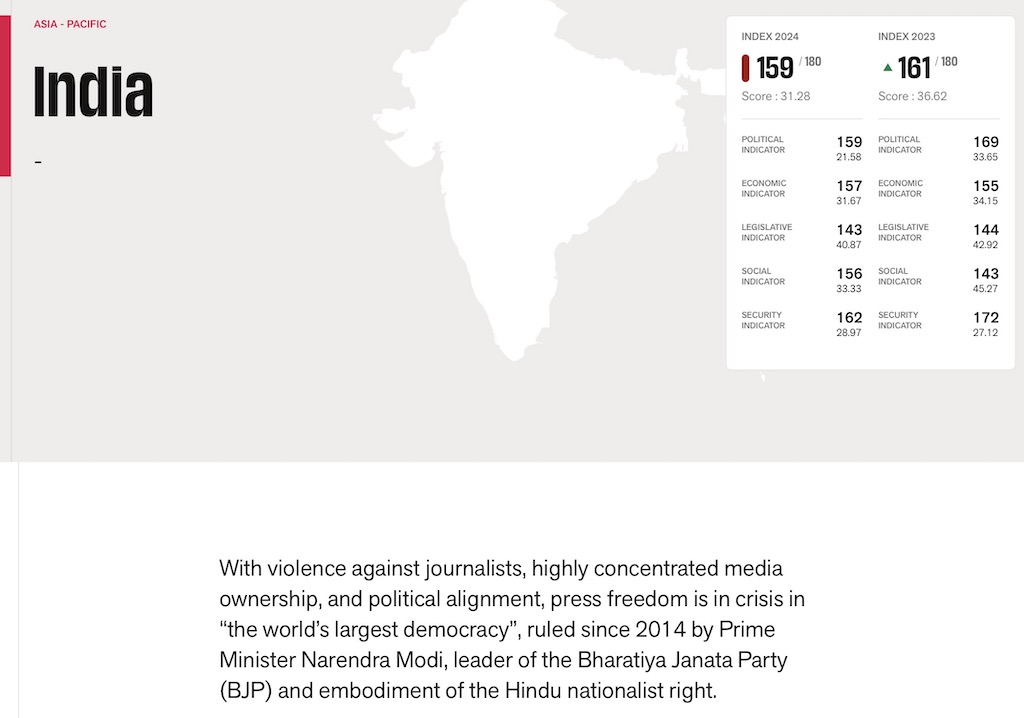Bringing Information to the Citizens
Right to Information Act 2005 mandates timely response to citizen requests for government information. […]
The basic object of the Right to Information Act is to empower the citizens, promote transparency and accountability in the working of the Government, contain corruption, and make our democracy work for the people in real sense. It goes without saying that an informed citizen is better equipped to keep necessary vigil on the instruments of governance and make the government more accountable to the governed. The Act is a big step towards making the citizens informed about the activities of the Government.
Source: About Right to Information Act 2005: Bringing Information to the Citizens
URL: http://rti.gov.in
Date accessed: 17 July 2018
“Opportunities are limited, jobs are scarce and so far ‘development’ remains a slogan. There’s a lot that is being done to keep caste going in spite of saying that we are trying to erode caste. We are, of course, dodging the real issue. It’s true that there has been a great deal of exploitation of Dalit groups and OBC’s [Other Backward Castes] in past history; making amends or even just claiming that we are a democracy based on social justice demands far more than just reservations. The solution lies in changing the quality of life of half the Indian population by giving them their right to food, water, education, health care, employment, and social justice. This, no government so far has been willing to do, because it means a radical change in governance and its priorities.” – Romila Thapar (Emeritus Professor of History, Jawaharlal Nehru University) in You can’t run disciplines on the basis of the notions that particular governments may have”: An Interview with Romila Thapar by Nikhil Pandhi (Caravan Magazine, 7 October 2015) | Learn more >>
“The theoretical debate on caste among social scientists has receded into the background in recent years. [C]aste is in no sense disappearing: indeed, the present wave of neo-liberal policies in India, with privatisation of enterprises and education, has strengthened the importance of caste ties, as selection to posts and educational institutions is less based on merit through examinations, and increasingly on social contact as also on corruption.” – Harald Tambs-Lyche (Professor Emeritus, Université de Picardie, Amiens) in “Caste: History and the Present” (Academia Letters, Article 1311, 2021) | Learn more >>

“India, also known as Bharat, is a Union of States. It is a Sovereign Socialist Secular Democratic Republic with a parliamentary system of government.” – Constitution of India
Source: National Portal of India
Learn more about the Indian Constitution and decisions by India’s Supreme Court >>

With an average of three or four journalists killed in connection with their work every year, India is one of the world’s most dangerous countries for the media. Journalists who are critical of the government are routinely subjected to online harassment, intimidation, threats and physical attacks, as well as criminal prosecutions and arbitrary arrests. They can be victims of violence, from police officers and political activists, as well as criminal groups and corrupt local officials. Proponents of Hindutva, the ideology of the Hindu far right, call for popular revenge against critics branded as “traitors” and “anti-national”. Terrifying coordinated campaigns of hatred and calls for murder are conducted on social media, campaigns especially violent when they target women journalists, whose personal data is divulged. The situation is also remains very worrisome in Kashmir, where reporters are often harassed by police and paramilitaries, with some being subjected to so-called “provisional” detention for several years.
“India Index” (2023 & 2024) by Reporters Without Borders (RSF)
URL: https://rsf.org/en/country/india
Date Visited: 3 May 2024
“The report titled, Who Tells Our Stories Matters: Representation of Marginalised Caste Groups in Indian Newsrooms, was released on 2 August. It studied the representation of people from different caste groups in the Indian media to document ‘who has a seat at the table and whose voice has a chance of being heard.’ It found that the ‘Scheduled Tribes are almost entirely absent, whereas the Scheduled Castes are represented mostly by social activists and politicians rather than journalists. English newspapers are worse than Hindi on representing Dalit, Adivasi writers.” – The Caravan, 3 August 2019 >>
Any move to amend the RTI Act must involve public consultation
Aruna Roy & Nikhil Dey, The Hindu, 17 July 2018 | Read the full comment here >>
[…] Since 2005, the Right to Information (RTI) Act 2005 has helped transform the relationship between the citizen and government, dismantle illegitimate concentrations of power, legitimise the demand for answers, and assist people in changing centuries of feudal and colonial relationships. But public servants, troubled by accountability, have seen this as interference. As a result, the RTI Act has been under constant threat of amendments. At least two major attempts to amend the Act have been met with such strong popular resistance that the government of the day has had to back off. […]
The spirit of the RTI law lies in not just the filing of an RTI application and getting an answer. It actually mandates the replacement of a prevailing culture of secrecy with a culture of transparency. […]
Citizens’ movements in India have been energetic and courageous. The use of the RTI has led to more than 70 citizens fighting corruption losing their lives, but the government remains unaffected. […]
Nikhil Dey and Aruna Roy are founder members of the Mazdoor Kisan Shakti Sangathan and National Campaign for People’s Right to Information
Source: Dark clouds over the RTI
URL: https://www.thehindu.com/opinion/op-ed/dark-clouds-over-the-rti/article24436554.ece
Date accessed: 27 July 2021
The Right to Information Act 2005 guarantees access to information about government policies and their implementation to Indian citizens. This short introduction analyses the evolution of this landmark Act, the procedures involved in seeking information, the duties of information suppliers, as also the kinds of information exempted from disclosure. Through in-depth comparative analyses of the law in various parts of the world, the book captures the strengths and drawbacks of the RTI Act, narrates success stories, and suggests policy measures to improve its implementation.
About the Author
Sudhir Naib is Professor, Organisational Behaviour and Human Resource Management, IILM Institute for Higher Education, New Delhi.
Source: Publisher’s information: The Right to Information in India by Sudhir Naib (Oxford India Short Introductions , 2013)
URL: https://india.oup.com/product/the-right-to-information-in-india-9780198089353?
Date accessed: 27 July 2021
Find publications by reputed authors (add “open access” for freely downloadable content)
Up-to-date reports by Indian journalists and commentators
To search Indian periodicals, magazines, web portals and other sources safely, click here. To find an Indian PhD thesis on a particular tribal community, region and related issues, click here >>
Search tips
Combine the name of any particular state, language or region with that of any tribal (Adivasi) community.
Add keywords of special interest (music, poetry, dance just as health, sacred grove and biodiversity); learn about the rights of Scheduled Tribes such as the “Forest Rights Act” (FRA); and the United Nations “Declaration on the Rights of Indigenous Peoples”, “Universal Declaration of Human Rights”, “women’s rights”, or “children’s right to education”.
Specify any other issue or news item you want to learn more about (biodiversity, bonded labour and human trafficking, climate change, ecology, economic development, ethnobotany, ethnomedicine, global warming, hunter-gatherers in a particular region or state, prevention of rural poverty, water access).
For official figures include “scheduled tribe ST” along with a union state or region: e.g. “Chhattisgarh ST community”, “Himalayan tribe”, “Scheduled tribe Tamil Nadu census”, “ST Kerala census”, “Particularly Vulnerable Tribal Group Jharkhand”, “PVTG Rajasthan”, “Adivasi ST Kerala”, “Adibasi ST West Bengal” etc.
In case the Google Custom Search window is not displayed here try the following: (1) toggle between “Reader” and regular viewing; (2) in your browser’s Security settings select “Enable JavaScript” | More tips >>
Note: hyperlinks and quotes are meant for fact-checking and information purposes only | Disclaimer >>
A constitution which guarantees: “The State shall not discriminate against any citizen” – The Sovereign Republic of India | Learn more >>
Tip: click on any red marker for details on endangered languages in a particular region of India.
Please note: the facts and figures cited (via hyperlinks) links call for updates and fact checking >>
Cultural invisibility – India’s 600 potentially endangered languages | Linguistic Survey of India (official website) >>